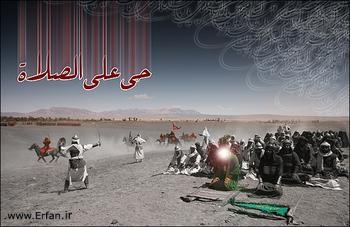
Adopted from the Book : "Shi'ism; Imamate and Wilayat" by : "Sayyid Muhammad Rizvi"
First let us see whether or not this division of appointment of caliphate into "implicit" and "explicit" has any historical precedence in the history of Islamic theology. For the sake of time restraint, let me just state the following historical facts :
1. On the issue of caliphate, the Muslims have different views. The SunniMuslims do not believe that the Prophet appointed anyone as his successor, neither explicit nor implicitly; and that it was left for the community to choose whomsoever they wanted. The Shi'as on the other hand, believe that the Prophet appointed 'Ali bin Abi Talib as the caliph and successor after him.
2. All the Shi'a sects (i.e. the Imamiyya Ithna -'Ashariyya and both the existing Isma'iliyya groups: the Bohras and the Agha Khanis) believe that the Prophet of Islam explicitly appointed Imam 'Ali on many occasions as his caliph and successor.
3. The Zaydiyya sect has belief different from the sunni as well as the Shi'as. Although they believe that 'Ali was the best and the most qualified for caliphate, they still accept Abu Bakr and Umar ibn al-Khattab Khattab as the first and the second successor of the Prophet respectfully; but they do not accept 'Uthman bin' Affan as the third claliph.
4. Historically speaking, it is the Jarudiyya subsect of the Zaydiyya that believed the the Prophet had appointed Imam 'Ali not by naming him but by just describing his qualities: "nass bi 'l -wasf dina 't -tasmiyya --- he [the Prophet] appointed by the description without naming [the person]."1
It is from this belif that the nass (the directive for appointment) is divided into "an-nass al-jali --- the clear /explicit directive" and "an -nass al khafi --- the hidden/ implicit directive".
But the Shi'a Imamiyya ithan -Ashariyya have never subscribed to the idea that "the foundation of our faith is based on this implicit sense.' They have believed all along that the Prophet Muhammad (s.a.w.) on several occasions, very clearly and very openly appointed 'Ali bin Abi Talib as his successor, caliph and Imam of the Muslims after him.2 Only when the Shi'a Imamiyya theologians were in debate against their opponents (including the zaydiyya), they used the term "an-nass al-jali" on the principle of dealing with the opponent on his own terms.3
So historically speaking, no Shi'a Imamiyya theologian has treated exclusively the path of implicit or implied appointment of Amiru 'l-Mu 'minin 'Ali bin Abi Talib (a.s.) as "the foundation of our faith" and none of them have taken the hadith of Ghadir as an implicit appointment.
5. Why did the Zaydiyya insist on the implicitness of the appointment of 'Ali to caliphate? Since some of their sub-sects had accepted the caliphate of Abu Bakr and 'Umar' believing in the explicit statements of the Prophet appointing 'Ali would portray those two caliphs in very negative light --- it would mean that they knowingly opposed the explicit statements of the Prophet! So in order to safeguard the prestige of the first two caliphs, the appointment of 'Ali was shrouded in ambiguity by saying that it was not explicit but only implied. And since it was not explicit the caliphs could not be blamed for usurping the caliphate from Amiru 'l-Muminin Ali.
This shows the serious implications of believing that the appointment of 'Ali was only implicit, it would mean that the blame of whatever happened after the Prophet's death on the issue of succession is to be placed on the Prophet himself, and not on the caliphs. It would mean that the first two caliphs are not to be blamed for usurping the caliphate from Imam 'Ali because they were doing what they thought, in the absence of any explicit instruction, was the best for Islam.
So when the objections of the Shi'a community against the learned scholar increased, the the last days of Ramadhan 1418, he issued a general circular addressed to the Shi'as via the Internet:
"I am taking this opportunity to state in the most ABSOLUTE terms that not only do I believe in the unequivocal authenticity of the event of al-Ghadir which took place on the 18th of Dhul-Hijja, 11 AH/632 CE. I believe that the statement by the Prophet, "Everyone whose master I am, also has 'Ali as a master,' to be the explicit designation of the Imam 'Ali to the office to the Leadership of the Muslim Community, as upheld by the Twelver Shi'a faith."4
____________
1. See 'Allama al- Hilli, Manahiju 'l-Yaqin, ed. M.R. al-Ansari (Qum, 1416) p.306; al- Mufid, Awa 'ilu 'l-Maqalat, p.41-42. After 'Ali, the Zaydiyya believe in Hassan and Hussayn and then in Zayd bin' Ali. After Zayd, any descendant of 'Ali and Fatima who does jihad against the tyrants, is pious and learned in religion can become their Imam.
2. See an-Nawbakhti (circ.3rd century AH), Firaqu 'sh-Shi'a (Beirut,1984) p.19. This book actually a summarized version of Maqalatu 'l Imamiyya of Sa'd bin 'Abdullah al- Ash 'ari al-Qummi and has been erroneously attributed to an-Nawbakhti. See S.M. Riza al-Hussayni al-Jalali, Firaqu 'sh- Shi'a aw Maqalatu 'l-Imamiyya li 'n Nawbakhti am li 'l-Ashari?" in the first issue of Turathuna, (Qum: Mu'assasa Ali 'Bayt,1405) pp.29-49
3. See for example, one of the most famous book of Shi'a thealogy, Kashfu 'l-Murad, the commentary (sharh) of Allamah al-Hilli on Muhaqqiq at-Tusi's Tajridu 'l -I 'tiqadat, tr. Abu 'l-Hasan Sha'rani (Tehran:Islamiyya,n.d.) p.516-518.
In Usulu 'l-Fiqh, the term "an-nass" means a statement whose meaning is very clear and specific. In these sense, an-nass, by definition, cannot be implicit or ambiguous, and so it cannot be divided into jali andkhafi.













